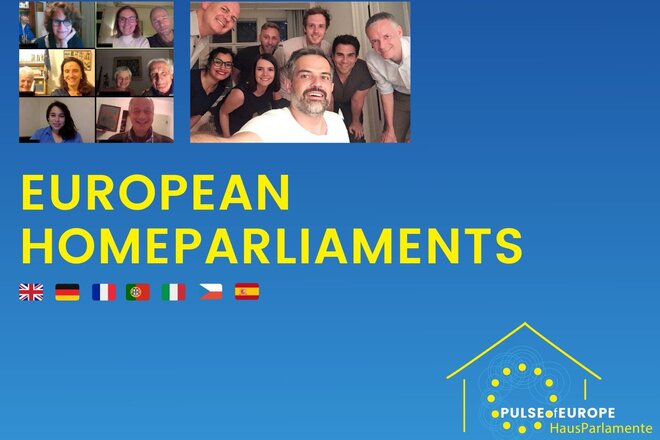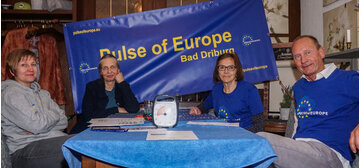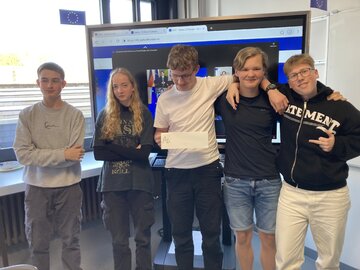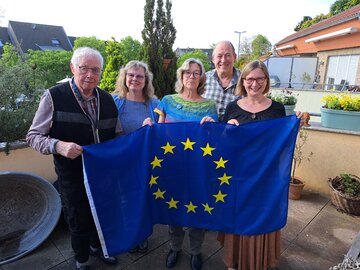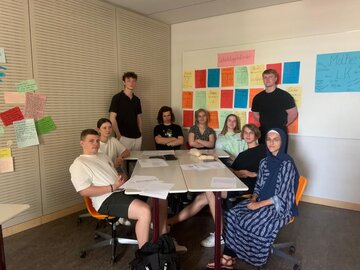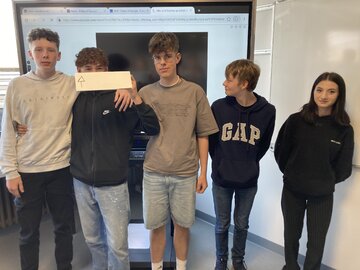bakgrunn
2023 is a special year, as we celebrate the 175th anniversary of the first all-German parliament at the founding site of Pulse of Europe e.V. in Frankfurt am Main. From 1848 to 1849, the members of the Frankfurt National Assembly discussed the formation of a German nation state and the adoption of a liberal constitution to establish a national democracy. 175 years later, we would like to invite you to reflect and deliberate on the future of European democracy in an open and engaged manner. Europe's democracy is under massive pressure: while authoritarian forces such as Russia and China are testing Europe's liberal and democratic societies from the outside, the EU is struggling internally with growing polarisation, scepticism about democracy, national egoisms and a sense of alienation between citizens and politicians. In addition, there are global challenges such as climate change, migration and artificial intelligence, as well as manipulation through fake news. With this 8th round of the European HomeParliaments, we are therefore focusing on the topic of "European citizen participation" and offering you the opportunity to reflect on the question: Does Europe's democracy need more citizen participation?
Delspørsmål
1. Should a European referendum be introduced in which all EU citizens can participate and thus have their say on issues concerning the future of Europe?
Bakgrunn: A constantly low voter turnout in European elections and the desire of many EU citizens for more co-determination raises the question of complementing the democratic procedures in the EU. In order to revitalise European democracy, the introduction of an EU-wide referendum is being discussed, in which EU citizens could vote on important European issues of the future. Conceivable are votes on issues where the EU institutions can exert influence, such as in the field of climate, trade, transport or social policy. It is still unclear whether the result of such a referendum would be binding for the members of the European Parliament or would only have an advisory function. A European referendum could be initiated by EU citizens or by the European Parliament. A European referendum was one of the demands of EU citizens in the context of the "Conference on the Future of Europe".
Per
A European referendum sends an important signal against disenchantment with politics and democracy, especially with regard to the EU.
Such a participation process brings European issues to the grassroots level and invites EU citizens to think from a European perspective beyond the national framework on the important issues of the future.
A European Referendum creates a participatory complement to the representative elements of EU democracy.
Kontra
Complex issues and decisions are difficult to reduce to just one voting question.
As with other participation procedures, it is to be expected that only those EU citizens will vote who also participate in European elections anyway and are politically interested.
If the results of such an EU referendum are not taken into account by politicians, this could lead to greater disenchantment with politics.
Tillegg fra møtene
A Europe-wide referendum could hold national governments accountable by putting forward questions on which the governments would not initiate voting. If the results are contrary to the governments’ position, they cannot quote “national interest” to refuse to act on the issue.
In countries where participation of elections is generally low, the European referendum is not likely to have a high level of participation.
2. Should EU citizens also be able to vote for candidates from other EU Member States in European elections via transnational lists?
Bakgrunn: Transnational lists in European elections are being discussed as a possibility for a stronger democratisation of the European Union. At present, candidates in the European elections are nominated via national lists. This means that voters only have the possibility to vote for national parties, so that the composition of the European Parliament is de facto determined by 27 national partial elections. In order to promote a "Europeanisation of European elections", a decision of the European Parliament in 2022 provides for the addition of a further vote to the European election ballot. The bill still has to be taken up by the EU Member States in the Council of the European Union. With the first vote, EU citizens would continue to vote for a national list; with the new second vote, they would have the opportunity to vote for an additional transnational list. Initially, only 28 out of a maximum of 751 MEPs in a pan-European constituency would be elected via transnational lists, with a mandatory geographical balance. The long-term goal is the formation of effective European parties in European elections.
Per
Transnational lists contribute to common political decision-making at the European level.
A pan-European election instead of 27 national partial elections moves the parties towards more European content and counteracts nationalism.
Currently, the votes of EU citizens from smaller EU Member States carry more weight in the European elections than the votes from the most populous EU Member States. In the long run, changing the electoral system may allow the introduction of equal votes for all EU citizens.
Kontra
Elections to the European Parliament will become more complicated and in need of explanation for EU citizens.
Foreign candidates are not known locally and the closeness of MPs to the people may be hampered by language differences.
Transnational lists weaken the federal principle within the EU. Parties of regional minorities would have a particularly hard time getting into the European Parliament this way.
Tillegg fra møtene
The idea is generally good, but in order to make elections transparent and fair, a limit should be put to the amount of money invested in campaigning.
It is questionable whether those with European parties would be able to run. However, setting up European parties for the sake of participating at the elections solely is counterproductive.
3. Should EU citizens decide at the local level how many refugees they want to accept in their region and thus facilitate a Europe-wide distribution?
Bakgrunn: European migration policy has been a highly controversial policy area for many years. There are sometimes major differences between the governments of the EU Member States and the regions regarding the willingness to accept refugees. In some places, local authorities and EU citizens are campaigning for refugees to be accepted over and above the national distribution key. In other regions, the acceptance of refugees according to the national distribution key is already met with protest. Studies suggest that migration movements to Europe will continue to increase due to climate change, political instability and wealth disparities. The question therefore arises whether EU citizens should be empowered by being able to vote regionally in their municipalities on how many refugees they want to receive locally. The voting results could be taken into account in the European distribution of refugees. This would also open up the possibility of EU aid money being paid directly to municipalities willing to take in refugees.
Per
More co-determination at the local level makes abstract European migration policy concrete and accessible to EU citizens.
Increased involvement of EU citizens in the distribution of refugees within the EU can lead to more understanding in the heated immigration debate and facilitate integration on the ground.
Different conditions and opinions in the regions can be taken into account so that problems can be avoided and special opportunities can be used (win-win situation).
Kontra
A strong rejection of the reception of refugees in individual regions may further exacerbate the imbalance in the distribution of refugees in the EU.
There is a risk of a misinterpretation of public opinion by a loud, dissenting minority facing an approving but silent majority.
The possibility of co-determination on the distribution of refugees could be used as a gateway to question the fundamental right to asylum as such.
Tillegg fra møtene
The funds given to the municipalities to support refugees would benefit the whole city, e.g., by building new infrastructure or renovating existing ones.
Municipalities in general are built from members who are connected to political parties thus they are not independent. If candidates are part of national governments, national politics will be enforced.
Kilder
- www.frankfurt-tourismus.de/en/Discover-Experience/Festivals-Events/st-pauls-church-festival-175th-anniversary
- www.europarl.europa.eu/at-your-service/en/be-heard/elections
- futureu.europa.eu/en/pages/reporting?format=html&locale=en
- www.europarl.europa.eu/news/en/press-room/20220324IPR26135/eu-elections-meps-want-transnational-lists-and-all-countries-to-vote-on-9-may
- espas.secure.europarl.europa.eu/orbis/sites/default/files/generated/document/en/Ideas%20Paper%20Future%20Migration%20Integration_V04.pdf
Evaluering
Does Europe's democracy need more citizen participation?
samtykker 59
Avslag 3
Avholdende stemme 8
Slik uttrykker adressatene seg
Die EU stellt in vielen Politikbereichen die Weichen für die nationale Politik, trotzdem findet sie im Vergleich oft weniger Beachtung in der Öffentlichkeit. Das liegt auch daran, dass wir in der EU oft hoch-technisierte und detailreiche Diskussionen führen, und ist deshalb ein Stück weit verständlich. Aber dennoch ist auch ein supranationales demokratisches System wie die EU auf den Input und die Beteiligung ihrer Bürger:innen angewiesen, insbesondere um gegen Populismus und Angriffe auf Rechtsstaatlichkeit und Freiheit gewappnet zu bleiben.
Beteiligung muss dafür aber auch bestimmte demokratische Kriterien erfüllen. Alle Bürger:innen müssen gleichermaßen Zugang zu den Beteiligungsoptionen haben, und es sollte von Beginn an klar sein, welche Wirksamkeit die Ergebnisse dann entfalten – sind sie einfach einer von vielen Inputs im Gesetzgebungsprozess, oder sind die Ergebnisse verpflichtend? Wenn hier die Erwartungen zu hoch gesteckt werden (Beispiel Umfrage Sommerzeit/Winterzeit) bringt Beteiligung oft nicht mehr Nähe zwischen Bürger:innen und Politik, sondern sorgt im Gegenteil für Frusterlebnisse.
1. Should a European referendum be introduced in which all EU citizens can participate and thus have their say on issues concerning the future of Europe?
Stemmeresultatene består av 438 innlagte resultater.
Trend (median)
Gjennomsnitt
2. Should EU citizens also be able to vote for candidates from other EU Member States in European elections via transnational lists?
Stemmeresultatene består av 438 innlagte resultater.
Trend (median)
Gjennomsnitt
3. Should EU citizens decide at the local level how many refugees they want to accept in their region and thus facilitate a Europe-wide distribution?
Stemmeresultatene består av 438 innlagte resultater.
Trend (median)
Gjennomsnitt
